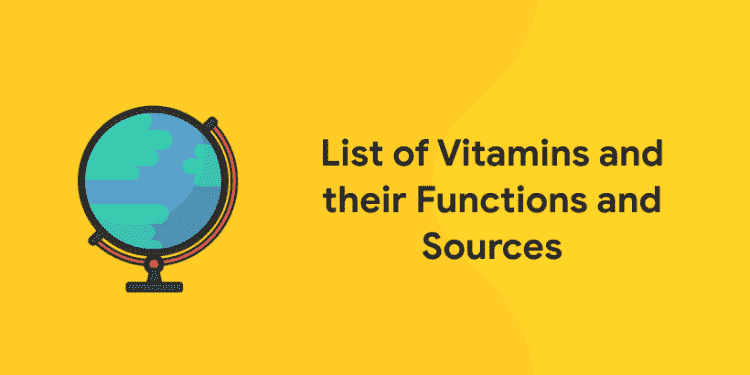A vitamin is an organic molecule or a set of molecules that is an important micro-nutrient. Every organism needs vitamins for good functioning of the metabolism in small quantities. Some vitamins can be synthesized and taken additionally by us. But not all vitamins can be synthesized, therefore we have to make sure to include it in our diet. Vitamins are groups of related molecules and not a single molecule in itself like vitamin E, which is a composition of 8 vitamins. Every vitamin has its own functions and comes from different sources. The only source of vitamins before 1935 was food. But now vitamins can are synthesized and can be taken by people. The article List of vitamins and their functions and sources will provide you with information on sources of vitamins, vitamins list, types of vitamins and functions of vitamins.
List of Vitamins and their Functions and Sources
The word vitamin was invented in the year 1912 by Casimir Funk, who was a Polish biochemist. Let us take a look at the list of vitamins below.
List of Vitamins
Below mentioned is the important vitamins list, vitamers and their solubility.
|
Vitamin |
Vitamers | Solubility |
| Vitamin A | Retinol, Retinal, alternative provitamin A-functioning Carotenoids including all-trans-beta-carotene |
Fat |
|
Vitamin B1 |
Thiamine | Water |
| Vitamin B2 | Riboflavin |
Water |
|
Vitamin B3 |
Niacin, Niacinamide, Nicotinamide riboside | Water |
| Vitamin B5 | Pantothenic acid |
Water |
|
Vitamin B6 |
Pyridoxine, Pyridoxamine, Pyridoxal | Water |
| Vitamin B7 | Biotin |
Water |
|
Vitamin B9 |
Folates, Folic acid | Water |
| Vitamin B12 | Cyanocobalamin, Hydroxocobalamin, Methylcobalamin, Adenosylcobalamin |
Water |
|
Vitamin C |
Ascorbic acid | Water |
| Vitamin D | Cholecalciferol (D3), Ergocalciferol (D2) |
Fat |
|
Vitamin E |
Tocopherols, Tocotrienols | Fat |
| Vitamin K |
Phylloquinone, Menaquinones |
Fat |
Types of Vitamins
Vitamins are divided into two types. Fat soluble and Water soluble vitamins.
Fat Soluble Vitamins
- Soluble in fat
- Require bile and lipids for absorption
- Can be toxic in large amounts (mostly results from supplements and not diet) as they are not readily excreted and are stored for later use
- Stored within the liver and fatty tissues until the body needs them so it does not require to be supplied by the diet always
- Slow onset of deficiency symptoms e.g. months to more than a year.
Water Soluble Vitamins
- Soluble in water
- Easily absorbed by the intestine
- Excess amounts are readily excreted within the urine so toxicity resulting from overdosing is rare
- It is not collected in a good quantity (except vitamin B12), so needs to be supplied by the diet frequently.
- Fast onset of deficiency symptoms e.g. weeks to months.
Sources of Vitamins
Let us take a look at sources of fat and water soluble vitamins
|
Nutrient |
Sources |
|
Thiamine (vitamin B1) |
Whole grain foods, breads and cereals, legumes, nuts and seeds |
|
Riboflavin (vitamin B2) |
Milk products; leafy vegetables; whole grain foods, breads and cereals |
|
Niacin (vitamin B3) |
Meat, poultry, fish, whole grain foods, breads and cereals, vegetables like mushrooms, asparagus, peanut butter |
|
Pantothenic acid |
Widespread in foods |
|
Biotin |
Found in foods; also created in intestinal tract by bacteria |
|
Pyridoxine (vitamin B6) |
Meat, fish, poultry, vegetables, fruits |
|
Folic acid |
Leafy green vegetables and legumes, seeds, fruit juice, and liver; now added to most refined grains |
|
Cobalamin (vitamin B12) |
Meat, poultry, fish, seafood, eggs, milk and milk products; not available in plant foods |
|
Ascorbic acid (vitamin C) |
Found only in fruits and vegetables, especially citrus fruits, vegetables within the cabbage family, cantaloupe, strawberries, peppers, tomatoes, potatoes, lettuce, papayas, mangoes, kiwifruit |
Functions of Vitamins
Each vitamin has an important role to play in the body. A vitamin deficiency occurs when you do not get enough vitamins. Vitamin deficiency lead to health problems. Not consuming adequate fruits, vegetables, beans, lentils, whole grains and fortified dairy foods may increase your risk for health problems, including heart disease, cancer etc.
- Vitamin A – helps in the formation of healthy teeth, bones, soft tissue, mucous membranes, and skin.
- Vitamin B6 – it is also knows Vitamin B6 assists in the formation of red blood cells and maintain brain function. This vitamin also plays an pivotal role in the proteins that are part of many chemical reactions in the body.
- Vitamin B12 – like the other B vitamins, and is essential for metabolism. It also helps in the formation of red blood cells and maintain the central nervous system.
- Vitamin C – also called ascorbic acid, is an antioxidant that promotes healthy teeth and gums. It assists the body in absorbing iron and maintain healthy tissue. It is also important for wound healing.
- Vitamin D – is also known as the “sunshine vitamin,” as it is created by the body after being exposed in the sun. A few minutes of sunshine daily is enough to produces the body’s requirement of vitamin D for most. It is very difficult to get enough vitamin D from food sources alone. Vitamin D assist the body in absorbing
- Vitamin E – is an antioxidant, which is also known as tocopherol. It helps the body in the formation of red blood cells and use vitamin K.
- Vitamin K – is essential because without it, blood would not coagulate. Some studies claim that it is important for bone health.
Vitamins Recommended Levels
|
Nutrient |
U.S. EAR | Highest U.S. RDA or AI |
Highest EU PRI or AI |
| Vitamin A | 625 | 900 |
1300 |
|
Vitamin C |
75 | 90 |
155 |
|
Vitamin D |
10 | 15 | 15 |
| Vitamin K | NE | 120 |
70 |
|
α-tocopherol (Vitamin E) |
12 | 15 | 13 |
| Thiamin (Vitamin B1) | 1.0 | 1.2 |
0.1 mg/MJ |
|
Riboflavin (Vitamin B2) |
1.1 | 1.3 | 2.0 |
| Niacin (Vitamin B3) | 12 | 16 |
1.6 mg/MJ |
|
Pantothenic acid (Vitamin B5) |
NE | 5 | 7 |
| Vitamin B6 | 1.1 | 1.3 |
1.8 |
|
Biotin (Vitamin B7) |
NE | 30 | 45 |
| Folate (Vitamin B9) | 320 | 400 |
600 |
|
Cyanocobalamin (Vitamin B12) |
2.0 | 2.4 |
5.0 |
We hope this article on List of Vitamins and their Functions and Sources is resourceful to you. For more knowledgeable and interesting GK quiz and updates, download Entri App. Check List of Important Minerals and their Functions.














